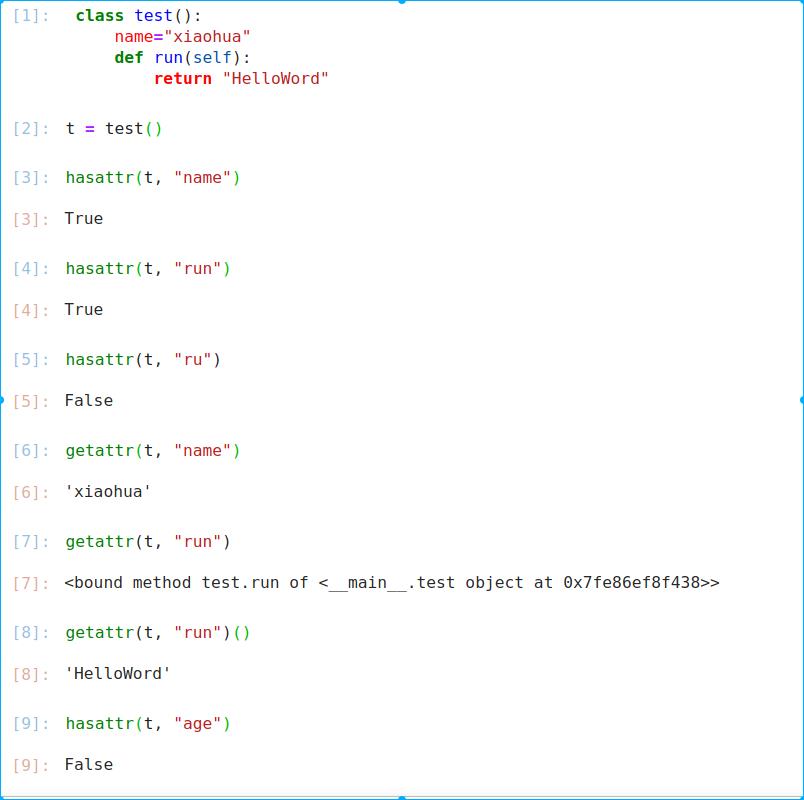hasattr(object, name)
判断一个对象里面是否有name属性或者name方法,返回BOOL值,有name特性返回True, 否则返回False。

class test():
name="xiaohua"
def run(self):
return "HelloWord"
>>> t=test()
>>> hasattr(t, "name") #判断对象有name属性
True
>>> hasattr(t, "run") #判断对象有run方法
True
getattr(object, name[,default])
获取对象object的属性或者方法,如果存在打印出来,如果不存在,打印出默认值,默认值可选。需要注意的是,如果是返回的对象的方法,返回的是方法的内存地址,如果需要运行这个方法,可以在后面添加一对括号。
getattr(obj,name[,default]) 其中obj为对象名,name是对象中的属性,必须为字符串
>>> class test():
... name="xiaohua"
... def run(self):
... return "HelloWord"
...
>>> t=test()
>>> getattr(t, "name") #获取name属性,存在就打印出来。
\'xiaohua\'
>>> getattr(t, "run") #获取run方法,存在就打印出方法的内存地址。
<bound method test.run of <__main__.test instance at 0x0269C878>>
>>> getattr(t, "run")() #获取run方法,后面加括号可以将这个方法运行。
\'HelloWord\'
>>> getattr(t, "age") #获取一个不存在的属性。
Traceback (most recent call last):
File "<stdin>", line 1, in <module>
AttributeError: test instance has no attribute \'age\'
>>> getattr(t, "age","18") #若属性不存在,返回一个默认值。
\'18\'
>>>
setattr(object, name, values)
给对象的属性赋值,若属性不存在,先创建再赋值。
>>> class test():
... name="xiaohua"
... def run(self):
... return "HelloWord"
...
>>> t=test()
>>> hasattr(t, "age") #判断属性是否存在
False
>>> setattr(t, "age", "18") #为属相赋值,并没有返回值
>>> hasattr(t, "age") #属性存在了
True
>>>
综合的用法
判断一个对象的属性是否存在,若不存在就添加该属性。
>>> class test():
... name="xiaohua"
... def run(self):
... return "HelloWord"
...
>>> t=test()
>>> getattr(t, "age") #age属性不存在
Traceback (most recent call last):
File "<stdin>", line 1, in <module>
AttributeError: test instance has no attribute \'age\'
>>> getattr(t, "age", setattr(t, "age", "18")) #age属性不存在时,设置该属性
\'18\'
>>> getattr(t, "age") #可检测设置成功
\'18\'
>>>
针对类的字典式使用
class Student:
def __init__(self,name,identity,age):
self._name = name
self._identity = identity
self.age = age
def __getitem__(self,item):
if isinstance(item,str):
return getattr(self,"_" + item)
>>> st=Student("Huang Lei",1323010212,12)
>>> st["age"]
Traceback (most recent call last):
File "<pyshell#56>", line 1, in <module>
st["age"]
File "<pyshell#54>", line 8, in __getitem__
return getattr(self,"_" + item)
AttributeError: \'Student\' object has no attribute \'_age\'
>>> st["name"]
\'Huang Lei\'
>>> s=["Huang Lei",1323010212,12]
参考其他文章:
https://www.cnblogs.com/cenyu/p/5713686.html
https://blog.csdn.net/AugustMoore/article/details/80989128